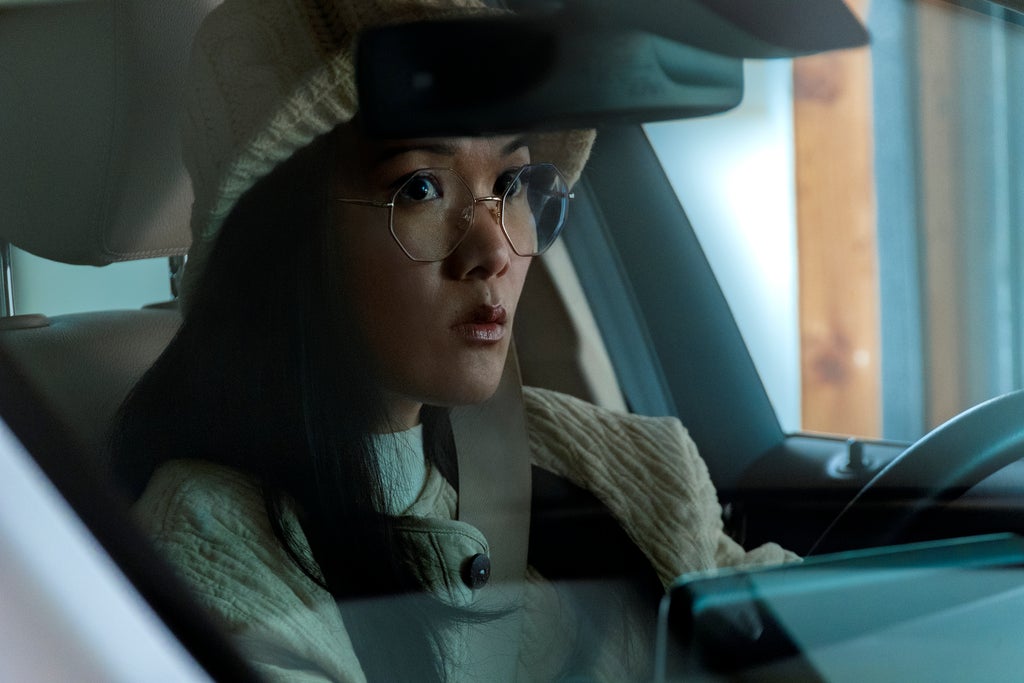
Lee Sung Jin’s Beef, dropping on Netflix April 6, kicks off with a high-speed car chase through the residential streets of LA’s San Fernando Valley after a near fender bender in the parking lot of Forsters, a fictional Costco-like store. Driving his beat-up pickup truck, down-on-his-luck contractor Danny Cho (Steven Yeun) initially assumes his road rage nemesis is a man. But, as the camera soon reveals, instead of Dominic Toretto, a petite woman sits behind the wheel of a white Mercedes SUV.
Later, safe in her garage, self-made entrepreneur Amy Lau (Ali Wong) steadily regains her composure. Her ensemble – an ivory cable-knit bucket hat (with the brim playfully flipped up), a quilted oatmeal jacket by Tonlé, and a tonal Eileen Fisher cashmere sweater – feels as soft and calming as Amy’s Insta-popular plant brand, Kōyō Haus. It also feels intentionally antithetical to her code red outburst from earlier. “She is very curated in that ‘Instagram-y’ way,” says costume designer Helen Huang. This idea of contradictions – that underneath our pristinely curated appearances is a simmering well of complexity, fury, and shame – is a recurrent theme throughout the 10-episode series.
“Amy has a costume that she puts on every day and that’s the image that she projects,” says Huang, who previously dressed Emma Roberts in Holidate, won an Emmy as part of costume designer Lou Eyrich’s team on American Horror Story, and imagined a dystopian future in Station Eleven.
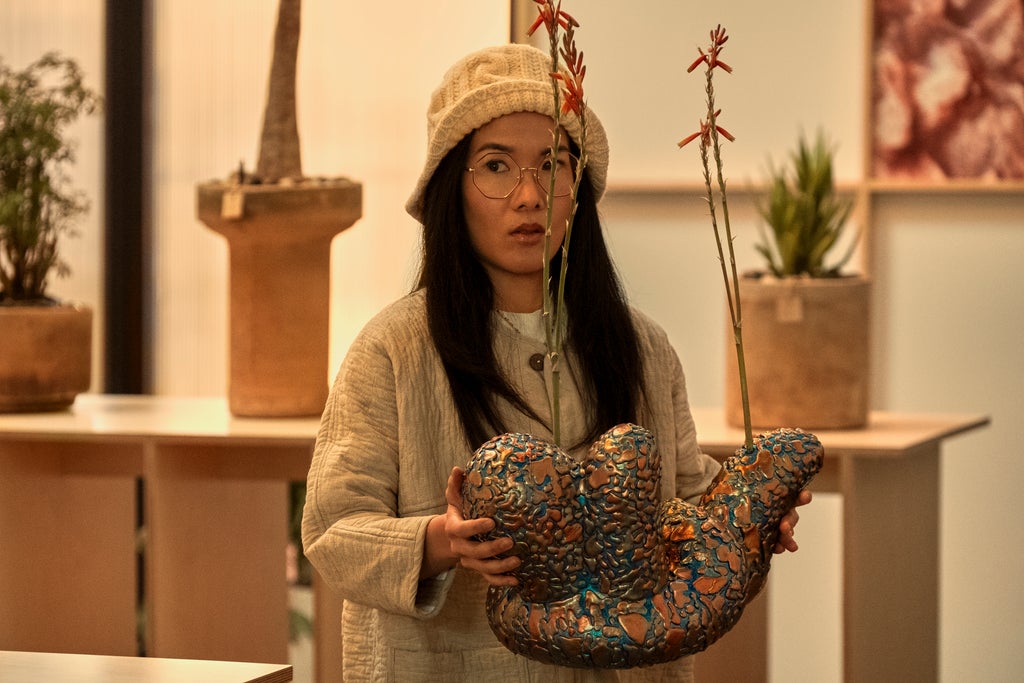
For Amy’s Calabasas mom-fluencer persona, Huang looked to Korean American designer and owner of Los Angeles-based Mohawk General Store, Bo Carney, for inspiration. Huang also referenced the sleek and comforting vibe of Kōyō Haus, which an overwhelmed Amy wants to sell to Forsters to finally spend time with her Insta-perfect family. “We tried to use a lot of organic fabrics; things that are cozier. We tried to dress her from the perspective of an artistic person,” says Huang.
Amy’s calming Coastal Grandma tones are a sartorial front for the dark emotions and impulses she keeps hidden from her family and world at large. Throughout the series, Danny and Amy proceed to pour their angst over societal and familial expectations, insecurities, resentments, and disappointments into increasingly abhorrent behavior as they seek revenge upon each other. The two first meet face-to-face (neither actually saw each other during the road rage chase) after Danny cons his way into Amy’s picture-perfect house and interrupts Amy partaking in an intimate moment.
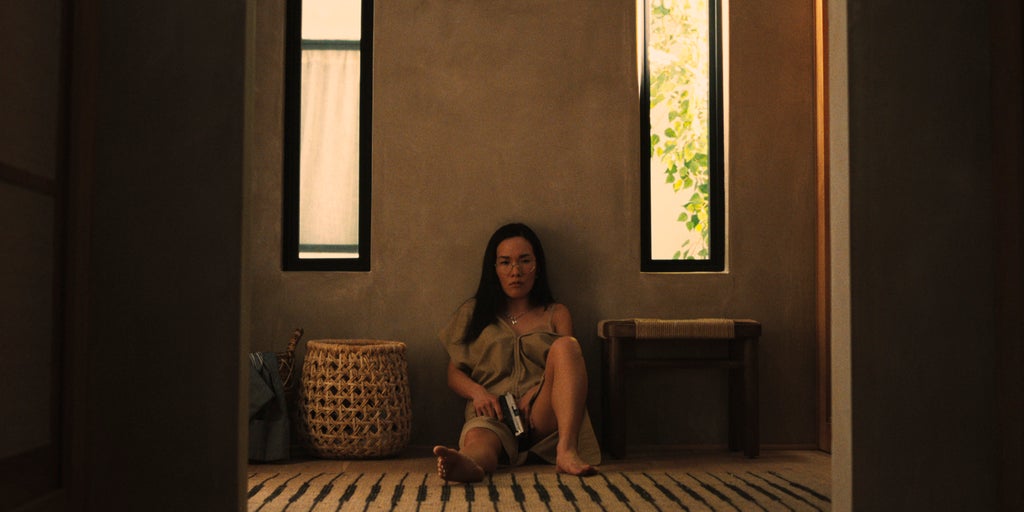
“[Wong] actually wanted a skirt for the masturbation sequence,” explains Huang, about Amy’s languid set from Baserange. “We wanted to be extremely neutral for that scene, because that scene is super, super intense.” The natural linen texture perfectly aligns with the gentle, earthy facade Amy constructs to mask her true disposition and intentions.
Later, preparing to seal the Forsters deal, Amy heads to Las Vegas for the retail juggernaut’s annual meeting. Going through an existential crisis, Amy gives herself a style transformation and debuts a severe bleached blonde bob and her version of a “power suit”: a sleeveless, deconstructed, black pinstriped Proenza Schouler dress with a fringe hem. “Amy dresses arty, so she would definitely keep her sense of self in that way, but [then] transition into a more serious color, in her mind,” says Huang, who evolved Amy into darker colors as she makes progressively questionable decisions.
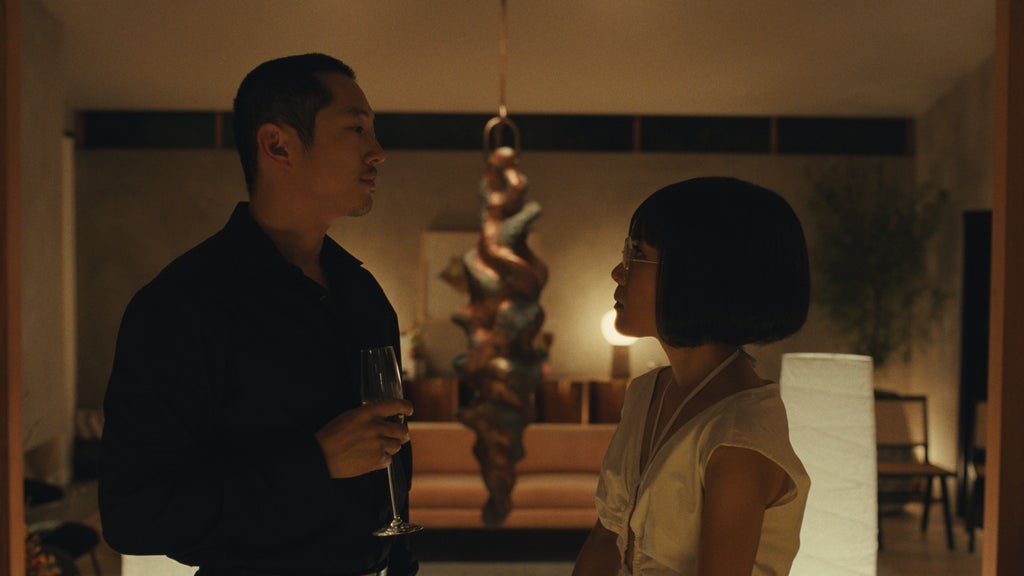
In the deceptive calm before the final storm, Amy returns to her natural hair color and reassuring neutrals, like a white cutout dress by Rachel Comey. “At that moment, she felt like she had her life more together, so to shift back to the white felt more natural,” says Huang. The two adversaries have a brief moment of connection. But that’s quickly annihilated after the dress literally reveals Amy’s reprehensible action that will lead to emotional and physical carnage to those closest to the duo.
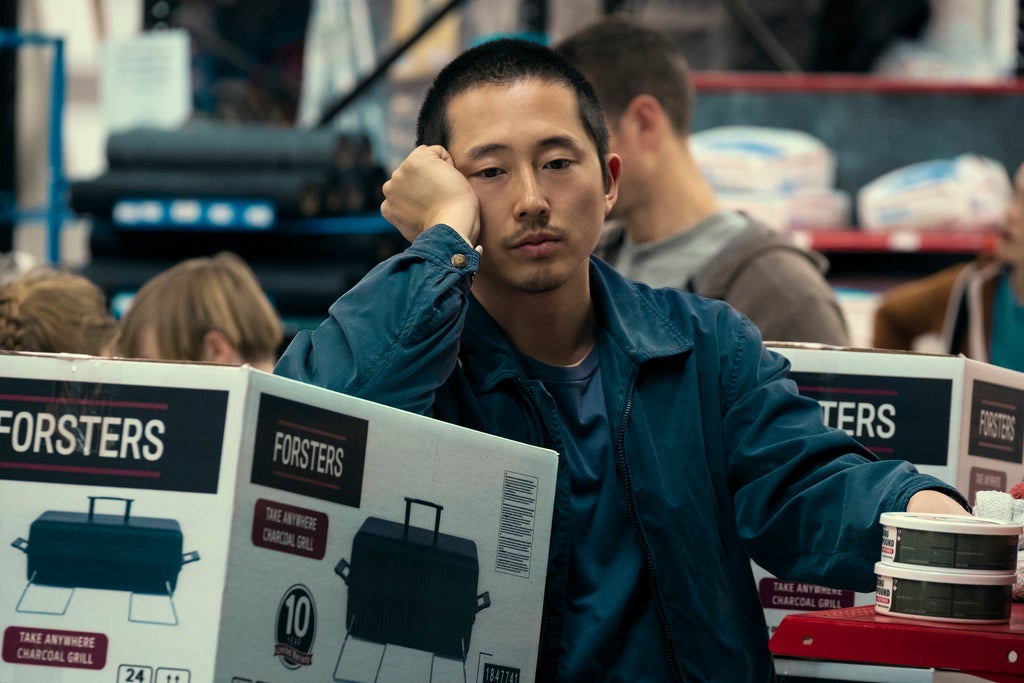
Her plush hues and architectural silhouettes also diverge from El Segundo-based apartment dweller Danny’s all-thrifted utilitarian T-shirts and zip-up jackets in grays and blues. “That was important to me, to contrast the different Asian communities, and where they live,” says Huang, who grew up in Los Angeles. For first-generation Korean American Danny, she referenced her step-brothers who hail from the industrial, LAX-adjacent city. “Even though his clothes are not as expensive — or as curated as Amy’s — he still has an image of what he wants to present to the world,” says Huang. “No one in this show escapes that.”
Amy’s husband and stay-at-home dad George (Joseph Lee), the son of a revered Isamu Noguchi-esque Japanese American artist, conducts school pickups like he walked out of a Cluél Homme editorial. “I wanted to show that not only is he [Amy’s] counterpart in this curated world, but also that Asian men are extremely stylish and can pull off anything,” says Huang, who dressed George in Japanese labels like Kapital, Batoner, and WTAPS, as well as cool European brands like Nanushka, Acne, and Officine Générale.
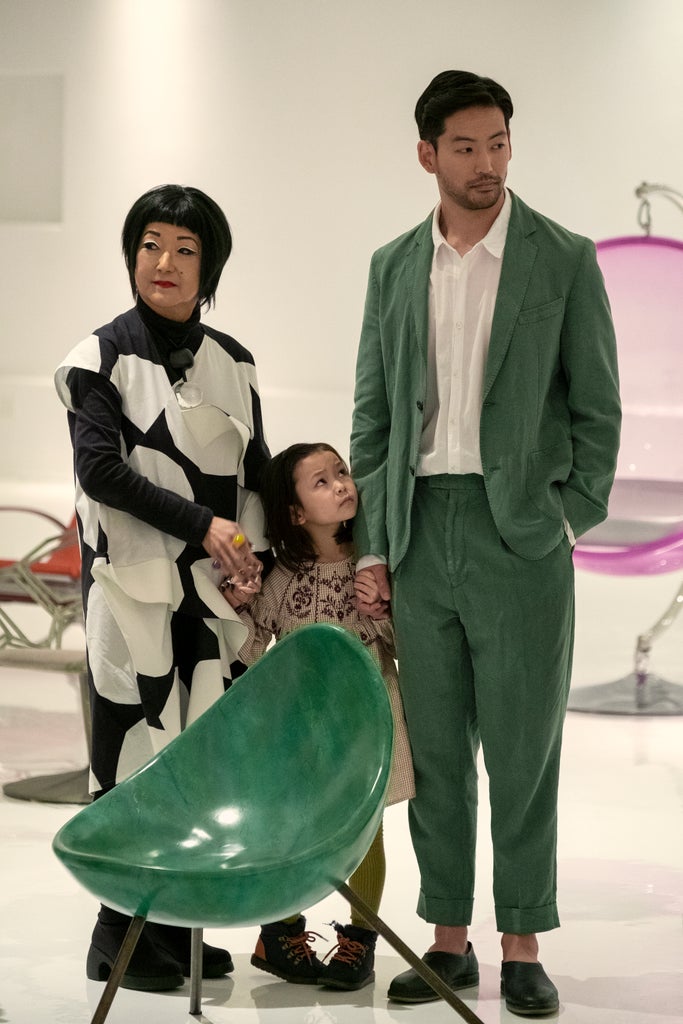
But it is George’s mother, Fumi (Patti Yasutake) who has the ultimate flair for conceptual fashion. Huang and creator Lee envisioned her to be “really stylish” and Commes des Garçons-referential, while also taking inspiration from Opening Ceremony founder Humberto Leon. Fumi’s black-and-white polka dot Junya Watanabe dress, early-‘80s Issey Miyake, and vintage Yohji Yamamoto and CDG contrast with her daughter-in-law’s modern minimalism — and highlight the different methods both strong women use to exert control over their complicated lives and trauma. “You create the truth you want to inhabit,” says Fumi, in divergent red-and-white patterns, to Amy, clad in her signature solids.
“I really wanted to show [a woman of Fumi’s generation] with a perspective,” says Huang. “Not dressing just to show off their bodies, but to show off an identity.”
Also in Amy’s orbit, gossip-y real housewife Naomi (Ashley Park) dresses to send her own message, while gunning for a spot on the “People to Watch” list for Calabasas Style magazine — which already profiled Amy. Huang took inspiration from Asian American influencer multihyphenates, like Aimee Song and Chriselle Lim, while also avoiding sartorial similarity to Park’s Emily in Paris character, Mindy, who’s also a rich socialite. In one scene, ensconced in her massive walk-in closet and feeling rejected by Amy, Naomi dejectedly models a shaggy brown coat over a blue, floral, puff-sleeve Reformation dress and contemplates two designer bags, one of which gives Valentino Rockstud vibes.
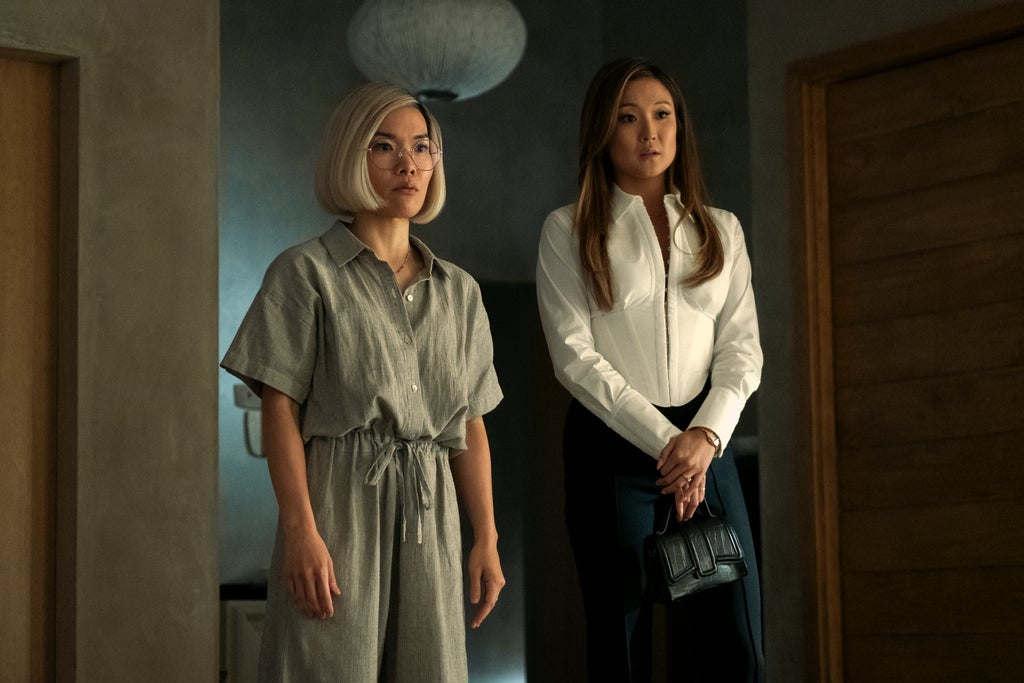
“She’s like the influencer that does the ‘basic’ look and then has a bag with the logo,” says Huang, who also dressed Naomi in influencer-popular labels, like Alo Yoga and Self Portrait. “She’s not creative like Amy or Fumi. She’s not a very bold dresser in any way.” Naomi “curates” her look for the ‘gram and her social status, while wielding her logomania handbags and accessories as clout.
“It was this idea of everyone [on this show] being very conscious of the way that they present themselves to the world,” says Huang.
The results are proof of the power of fashion as a reflection of identity.
Like what you see? How about some more R29 goodness, right here?
